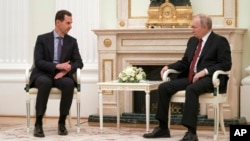The main commander of the Syrian fighters who deposed strongman Bashar al-Assad said Wednesday that anyone involved in the torture and killing of people Assad detained during his iron-fisted rule would be hunted down, with pardons out of the question.
“We will pursue them in Syria, and we ask countries to hand over those who fled so we can achieve justice,” Abu Mohammed al-Jolani said in a statement published on the Syrian state TV’s Telegram channel.
Jolani’s vow to extract revenge against Assad’s lieutenants of torture and death came as the world is watching to see if Syria’s new rulers can stabilize the country after civil war fought for nearly 14 years along sectarian and ethnic lines has left it in shambles.
Mohammed al-Bashir, the man installed by Jolani’s fighters to lead an interim administration through March 1, pleaded with millions of refugees to return home, create unity and provide basic services. But rebuilding is a daunting proposition with little funding on hand.
“In the coffers, there are only Syrian pounds worth little or nothing. One U.S. dollar buys 35,000 of our coins,” Bashir told Italian newspaper Corriere della Sera.
“We have no foreign currency, and as for loans and bonds, we are still collecting data. So yes, financially we are very bad,” said Bashir, who previously ran a small rebel-led administration in a pocket of northwestern Syria.
But Bashir said the Islamist-led alliance that ousted Assad will guarantee the rights of all religious groups.
“Precisely because we are Islamic, we will guarantee the rights of all people and all sects in Syria,” Bashir said.
More than 500,000 people were killed in the war, with more than half the population forced to flee their homes. About 6 million Syrians sought refuge abroad.
Bashir pleaded with those who fled the violence to return home. In his interview with Corriere della Sera, he said, “Syria is now a free country that has earned its pride and dignity. Come back.”
Foreign officials are warily engaging with the former rebels, part of the former al-Qaida affiliate Hayat Tahrir al-Sham, which remains designated as a terrorist organization by the United States, the United Nations, the European Union and others.
U.S. Secretary of State Antony Blinken said the new government must “uphold clear commitments to fully respect the rights of minorities, facilitate the flow of humanitarian assistance to all in need, prevent Syria from being used as a base for terrorism or posing a threat to its neighbors.”
U.N. Secretary-General Antonio Guterres said, “It’s our duty to do everything to support different Syrian leaders in order to make sure that they come together, they are able to guarantee a smooth transition.”
But the U.N.’s Office for the Coordination of Humanitarian Affairs said the security situation in Syria remains volatile. The agency said it has found more than 50 minefields over the past 10 days, which is curtailing the movement of civilians and impeding the delivery of goods and services.
Meanwhile, Russia, which had supported Assad’s fight against the rebels and now has granted him asylum, said Wednesday it is closely monitoring the situation in Syria and is in contact with “those who are currently controlling the situation.”
Kremlin spokesman Dmitry Peskov highlighted Russia’s need to ensure the security of its diplomatic facilities and its military bases in Syria, where Russian troops were based for years supporting the Syrian military in the country’s civil war.
Assad’s fall also dealt a blow to Iran’s interests in the region, cutting off a land delivery route for weapons to the Iran-backed Hezbollah militant group in Lebanon, as well as territory in which Iranian militias could operate.
Iran’s Supreme Leader Ayatollah Ali Khamenei on Wednesday rejected the idea of a weakened Iranian network in the region, which includes its support of Hamas militants in the Gaza Strip, militias in Iraq and Houthi militants in Yemen.
Khamenei also said what happened in Syria was the result of a U.S.-Israeli plan, and that a “neighboring state” of Syria played a role in Assad’s ouster. He did not name the
neighboring country, but Turkey, which borders Syria, was a main supporter of groups that opposed Assad.
As Syrians work to establish the future of their country, Pope Francis said Wednesday he hoped for a political solution that promotes “the stability and unity of the country.”
“I pray … that the Syrian people may live in peace and security in their beloved land and the different religions may walk together in friendship and mutual respect for the good of that nation afflicted by so many years of war,” he said.
Some information for this report was provided by The Associated Press, Agence France-Presse and Reuters.



